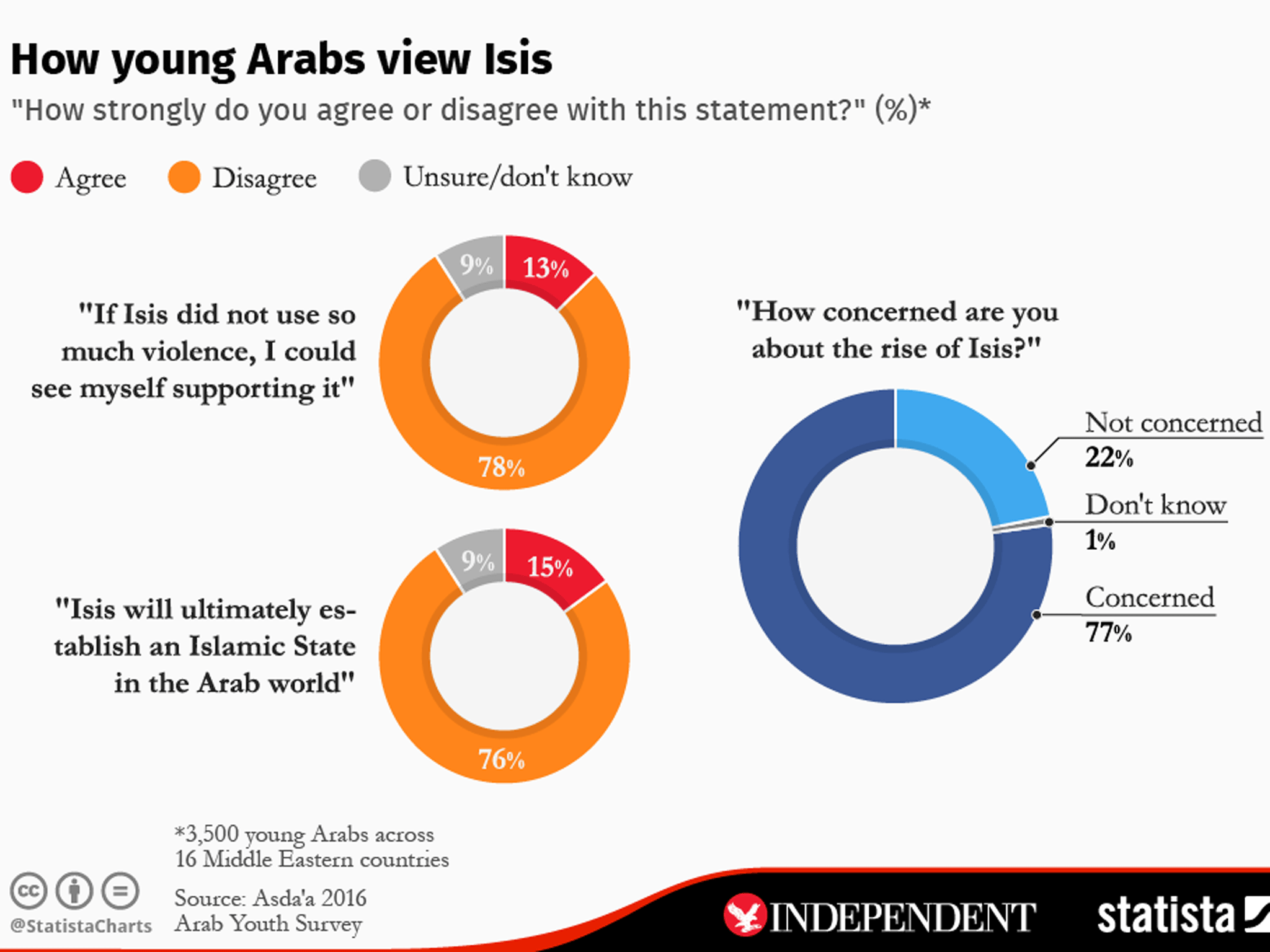Isis not supported by overwhelming majority of young Arabs, research suggests
The comprehensive study of young people living in 16 different countries in the Middle East and North Africa found very little support for the terror group and most believe the group will fail

Your support helps us to tell the story
From reproductive rights to climate change to Big Tech, The Independent is on the ground when the story is developing. Whether it's investigating the financials of Elon Musk's pro-Trump PAC or producing our latest documentary, 'The A Word', which shines a light on the American women fighting for reproductive rights, we know how important it is to parse out the facts from the messaging.
At such a critical moment in US history, we need reporters on the ground. Your donation allows us to keep sending journalists to speak to both sides of the story.
The Independent is trusted by Americans across the entire political spectrum. And unlike many other quality news outlets, we choose not to lock Americans out of our reporting and analysis with paywalls. We believe quality journalism should be available to everyone, paid for by those who can afford it.
Your support makes all the difference.An overwhelming majority of Arab young people don’t support Islamic State (Isis) and think it will fail, new research has suggested.
The Arab Youth Survey has found that contrary to the terror group’s claims to represent the region, relatively few young people support their aims and most describe themselves as deeply concerned by Isis.
The major study involved face-to-face interviews with 3,500 people aged 18 to 24 living in 16 different countries in the Middle East and North Africa. The research is conducted annually by public relations firm ASDA'A Burson-Marsteller. It found that the terror group’s “savage tactics and twisted interpretation of Islam are roundly rejected by the overwhelming majority of young Arabs.”
77 per cent of those surveyed said that they are “concerned” by the rise of Isis. Just 15 per cent believe that the group will ultimately succeed in its aim of establishing an Islamic state, while 76 per cent say they believe it will fail.

The above graphic was produced for the Independent by Statista.
The study found that young people not only disagreed with Isis’ violence but also with the group’s fundamental beliefs. When asked if they could be drawn to support Isis if they used less violent tactics, the results remained strongly against, with 78 per cent disagreeing, 13 per cent agreeing and 9 per cent of respondents saying they were unsure.
When asked what they felt the primary factors luring people into the group were, the young people most commonly suggested lack of employment opportunities among youth leading to disenfranchisement and economic desperation.
Hassan Hassan, a fellow for Middle East Policy in Washington DC said of the findings: “As responders to the survey show, lack of jobs and opportunities is often identified as a top driver behind membership in such organisations. Members do not say they join for economic reasons, but other factors they identify- including ones related to religious reasons could be a proxy of economic or social factors."
Mr Hassan added that this meant that in order to secure long term peace and stability, Isis could not be tackled only as a military threat, but that underlying social and economic factors in the Middle East must be addressed also especially among vulnerable and disaffected youth. He said: “The solution to Daesh must not be limited to military and security responses. The organisation thrives on political, economic, social and religious failures. Daesh may weaken and disappear, but the underlying sickness will remain and similar groups will emerge if that sickness is not addressed.”
Concerns over the threat of Isis are growing, with 50 per cent of young people saying that the group’s presence is their single biggest fear, up 37 per cent from last year. Isis’ violence has been perceived as increasing in recent months, following a series of bombings in Europe and accounts of horrific physical and sexual violence by victims captured by the group for forced marriages with Isis fighters.
Research conducted in November across all age groups in 11 different countries in the Middle East found that residents had “overwhelmingly negative views” of the group.
Due to the covert nature of Isis operations, the groups’ membership numbers are difficult to accurately ascertain and intelligence organisations’ estimates vary widely. The CIA has estimated that it has between 10,000 and 20,000 members, however the Russian government puts the number at 70,000.
Last year, Jeb Bush claimed in a speech that the group had 200,000 members but later stated that he had meant to say 20,000 but misspoke.
Join our commenting forum
Join thought-provoking conversations, follow other Independent readers and see their replies
Comments